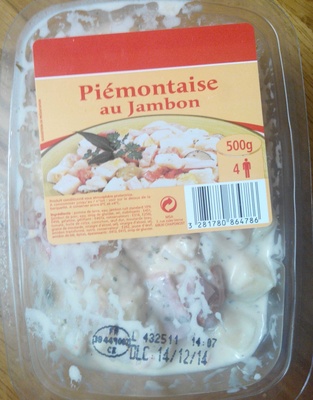Piémontaise au Jambon - Sans marque - 500 g (4 personnes)
This product page is not complete. You can help to complete it by editing it and adding more data from the photos we have, or by taking more photos using the app for Android or iPhone/iPad. Thank you!
×
Barcode: 3281780864786 (EAN / EAN-13)
Common name: Piémontaise au jambon
Quantity: 500 g (4 personnes)
Packaging: Plastic, Fresh, Protective gas, Seal, Tray, fr:Film plastique
Brands: Sans marque, MSA
Categories: Snacks, Meats and their products, Salty snacks, Appetizers, Meals, Fresh foods, Prepared salads, Meals with meat, Fresh meals, Pork meals, Potato dishes, Potato salads, Cold starters, Piemontese salads, Piemontese salads with ham, Salads
Labels, certifications, awards:
Green Dot, fr:Eco-Emballages
Manufacturing or processing places: Martinet (Filiale FPM) - 24 Rue du Limousin - Zone Industrielle - 38070 Saint-Quentin-Fallavier, Isère, Rhône-Alpes, France
Traceability code: FR 38.449.002 CE - Saint-Quentin-Fallavier (Isère, France)
Countries where sold: France






